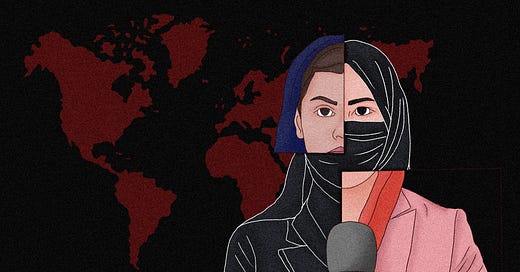In the months after the Taliban seized power, the female reporters at Rasa TV continued almost as normal, gathering stories and reporting on screen. They obtained a permit and renamed the channel Rasa Zan to prioritize issues affecting women in Afghanistan. Zan means woman in Persian, and manager Azita Nazhand wanted to amplify female voices across the country. “We saw a need for female-driven media, so we dedicated ourselves exclusively to women in Afghanistan,” the 25-year-old says.
Soon, new restrictions came in, preventing men and women from working in the same environment. Rasa Zan shifted to a female-only staff, hiring female camera crew and technicians alongside the reporters working on screen. Then, they were told in May 2022 that female reporters needed to cover their faces on air, following a decree earlier in the month ordering all women in public to cover completely, leaving only their eyes exposed.
“At first, women had no problem working, but slowly, they increased the restrictions on us,” Nazhand says.
By this point, it was becoming clear that the Taliban had no intention of honoring promises to respect the rights of women. A decree banning girls from attending school after sixth grade had provoked international condemnation, and in December 2022, they issued a statement that barred Afghan women from university.
Nazhand had been studying economics at a private university in Afghanistan when the previous government collapsed in August 2021. “Before the Taliban took over, women were able to study, own businesses, work—they were free to do all the things a man could,” she recalls. Three years later, life has changed beyond recognition. “Basically, the right of being a normal human has been taken from women; the situation is getting worse day by day,” she says.
Forced to leave university and abandon her studies, she immersed herself in life at Rasa Zan TV, but there, too, the obstacles were mounting. Strict limitations prevented them from making the same programs as before, restricting them to a limited repertoire of subjects that met with Taliban approval. “They don’t let you show the things people want to watch—drama series, important news coverage—so we can’t get advertisers, and our revenue has fallen,” Nazhand says.
An Innovation Hub grant from Ideas Beyond Borders has allowed them to invest in several new projects, including a program on women’s rights in Islam and a series on successful female leaders across the country. “The fund came at a critical moment when we had no other support. If more foreign organizations realize the impact of supporting female-led media organizations in Afghanistan, it will have a very deep impact on women in the country.”
Several media platforms operate externally to avoid Taliban restrictions, using female reporters in the country to gather news covertly. Nazhand dreams of establishing an external outlet that will enable her to cover the wide range of issues affecting Afghan women. This would include educational programs and segments on female health and depression. Until then, she will continue their work locally, despite regular rulings that continue to narrow the space for female reporters.
“Nazhand and her team at Rasa Zan TV are continuing their work in increasingly difficult circumstances because they see no alternative. Their commitment to maintaining a female presence in Afghan media and amplifying the voices of women is a glimmer of hope for their viewers across the country,” says Faisal Al Mutar, President of Ideas Beyond Borders.
There is talk of a new law that will fully bar female reporters from appearing on-screen. If this happens, the channel will switch to using the voices of female hosts off-screen. “We want to carry on because, as women, we should have equal rights to men,” Nazhand says. She has seen many women, herself included, hurt by the rulings of the Taliban regime. “The more limitations placed on women, the more motivated I am to find a way to include them in every field, beginning with the media,” she says.
“My dream is that one day, women will be able to work in every field again without any kind of discrimination. I want to continue this work at any cost, I will never let the female voice down.”
This article was written by Olivia Cuthbert.




